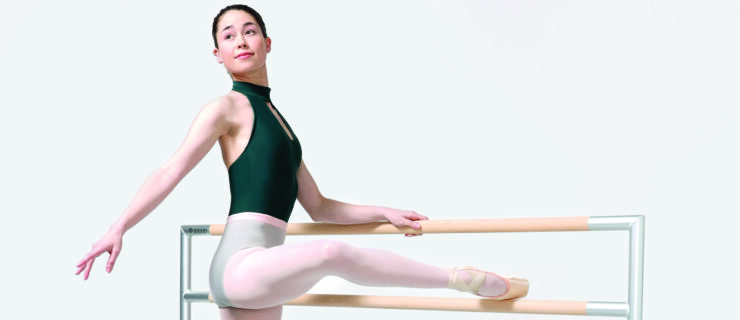The Audition Prep Timeline
It’s only natural to be nervous before an audition, as you size up the competition and try to ignore that persistent ache in your left ankle. But there are ways to alleviate both mental and physical jitters. What are the keys to feeling as comfortable as possible? Start your preparations early, stick to a timeline and think about all aspects of your dancer body. We asked a dietitian, a psychologist, a physical therapist and a company director for their audition prep advice.
One to Two Months Before
Technically: Research the company you’re auditioning for. “Find out if they’ll be performing near you, and see any shows you can,” recommends Olivier Wevers, director of contemporary ballet company Whim W’him. Once you learn about the type of work a company does, you can target your training. See a lot of hard-hitting movement? Consider adding a few hip-hop classes to your schedule. Are the dancers known for collaborating with the choreographer? Add an improv class to the mix.
Mentally: The big day may seem far off, but this is when you should start getting in the audition mindset. “Start approaching your regular classes like auditions,” says Dr. Millie Figueredo, a psychologist with Miami City Ballet School. “Think about showing confidence and projecting your passion through your movement.”
Nutritionally: “Focus on eating whole foods—a variety of lean proteins, complex carbs and healthy fats,” says Alexis Appel, a registered dietitian based in Charleston, SC. “Limit your intake of highly processed foods, candies and sodas.” Eating cleanly will help you perform at your peak, and it can also help prevent illness—because the last thing you need before an audition is a nasty cold or flu that can set you back weeks.
Physically: Get in the habit of sleeping at least eight hours each night, so you don’t have a cumulative sleep deficit as you approach audition day. This is also the time to start a physical-therapy program, since muscles need about six to eight weeks to show lasting changes in strength and endurance. “Ask a physical therapist to help you address any areas that have been injured in the past,” says Heather Southwick, Boston Ballet’s director of physical therapy. Southwick also recommends working with a dance teacher to develop a personalized 30-minute warm-up to use before the audition. Build it around core stabilizing elements, dynamic stretching and any individualized exercises your body needs.
One to Two Weeks Before
Technically: “This is when you should focus on any unique quirks or technical details a company is known for,” says Wevers. “For instance, at Whim W’him, we have a very precise way of moving our feet, so think about how you’re using yours. Or, if the company’s dancers have beautiful upper bodies, you’ll want to refine your own arm movements so that motion is in your muscle memory.”
Mentally: Build your confidence by writing out the reasons you’re a good fit for the troupe or project you’re auditioning for. “Make a list of your strengths and things you will bring to the company,” Figueredo says.
Physically: At this point, consistency is key. “Don’t do anything new or intense this close to an audition,” Southwick warns. Use your customized warm-up routine before classes, and make tweaks if necessary. And if you’re nursing an injury, Southwick says, “make informed choices on how to manage it. Does it need extra warm-up time? Or does it need a decreased load? Maybe you only do one jump combo, for instance, or only the first round of each combination.”
Nutritionally: “Use this week to find out which foods give you the most energy without upsetting your stomach,” Appel says. “Nuts or raw veggies can be a great snack, but if they cause gas and bloating, they probably aren’t what you should have before the audition.”
One Day Before
Technically: Take a nice, relaxed class. Don’t be tempted to skip it. “You want to be rested, but think about how a first class back is on a Monday after a weekend or after taking a short vacation—you’re not always together,” Wevers says.
Mentally: “Don’t put any extra pressure on yourself,” Figueredo says. “Instead, think about all the preparation you’ve done. You’re ready. Now relax. You want your mind to be clear and in a positive place.”
Nutritionally: Don’t make any sudden change to your eating habits. Stick to your plan. “You’ve created a schedule for your stomach, and you don’t want to shock your system,” Appel says. Make sure to drink plenty of water so you’re well hydrated for the big day.
Physically: “Back off a little,” Southwick says, so you’re fresh for tomorrow. “Do your warm-up routine, take class, but don’t try anything new.”
One Hour Before
Technically: Remember that you’re being evaluated on more than just your dancing. Be courteous to your fellow auditionees. “I observe the dancers from the moment they’re in the building,” says Wevers. “I can see how they deal with stress, and how they act under pressure.”
Mentally: “Try a simple breathing exercise to center your mind,” Figueredo says. “Close your eyes or focus on a fixed point. Inhale for five or six slow counts, hold it for a second, and then count backwards from five or six as you exhale.” Focusing on your breathing will help clear last-minute worries from your head.
Nutritionally: “Eat a snack 30 minutes to an hour before go time,” Appel says. A
mix of protein and fruit—Greek yogurt with berries, a banana with peanut butter—will give you good, steady energy. And while you’ll want to keep a water bottle nearby, Appel suggests limiting your intake about 20 to 30 minutes before the audition. You don’t want to have to use the restroom mid-class.
Physically: You’ll need at least a half-hour for your prepared warm-up, so leave enough time for that after you’ve changed and eaten. “Try to carve out about six feet of room around you for your warm-up, because you’ll need the space for your dynamic stretches—things like walking battements, side lunges, or walks with front attitude swings,” Southwick says. Merde!



